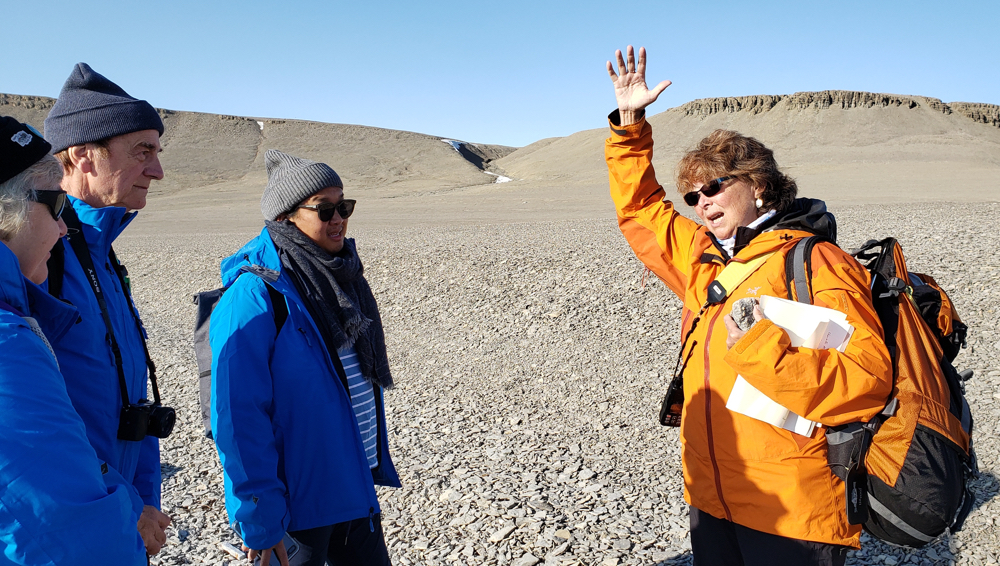
Charlotte was one of the many knowledge experts on my trip to the High Arctic with Adventure Canada. She's explaining the Arctic desert that has the occasional microclimate that supports plant life.
Educational travel is on the rise, especially in the 20-something category.
But don't leave any generation out. People of all ages are planning learning vacations.
Planning your trips around what you want to learn is a great way to choose a destination and enrich your travel experience.
For solo travelers, educational travel (taking classes for a day or a month or more while away from home) is about much more than the education. It's also about the community that you enter and the friendships that can be formed with people who share your interests.
Educational travelers seek authentic ways to experience a destination. They enjoy learning new things while getting closer to the culture they're exploring. I've taken my curiosity with me on many trips and done a lot of learning along the way.

I spent a week at Chautauqua Institution which offers lots of learning opportunities. Read How to Chautauqua: Your Guide to a Summer of Learning and Fun.
A Primer on Educational Travel
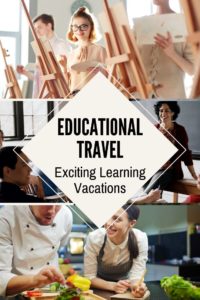
Pin it on Pinterest!
First, let's define educational travel.
- Educational travel can mean many things. It might mean studying abroad or within your own country. As a traveler, it could mean taking an intensive course on a language or a particular subject like archaeology. You travel to where your subject of interest is part of the culture. You might study art history in France or cooking in Italy so that the experience goes beyond the classroom. Educational travel can also mean taking a day class in a particular topic to develop new skills and knowledge.
- Who are educational travelers? Educational travelers are curious. They don't just want to see things like the Eiffel Tower. They want to understand who were the players that got it built, why so much was invested into building the tower, and what technical feats were overcome to build it. In other words, they want to understand the social, economic, and cultural context of the creation of the tower. Maybe this involves taking a history course in Paris or traveling with a tour company that has experts along delivering lectures and answering questions onsite. People who do educational travel want to see the world firsthand and get much more than a few words from a local tour guide.
- Where do educational travelers go? They go where their interests take them. Spanish can be learned in Spain or South America. There are volunteer opportunities at archaeological sites in dozens of locations around the world. You'll find cooking classes for every cuisine but the best are in their particular place of origin. Educational travelers go where their learning is enriched by being immersed in the context of the subject.
- How much time is required for educational travel? Time can be a factor. You might need a couple of months or longer for a language course but only a week for a solid introduction to a culinary style.
- Why is educational travel popular? There is nothing better for the curious traveler than finding ways to deepen their understanding of a particular subject and of the world. It combines the richness of classroom/studio learning with the fun, cultural experience of travel.
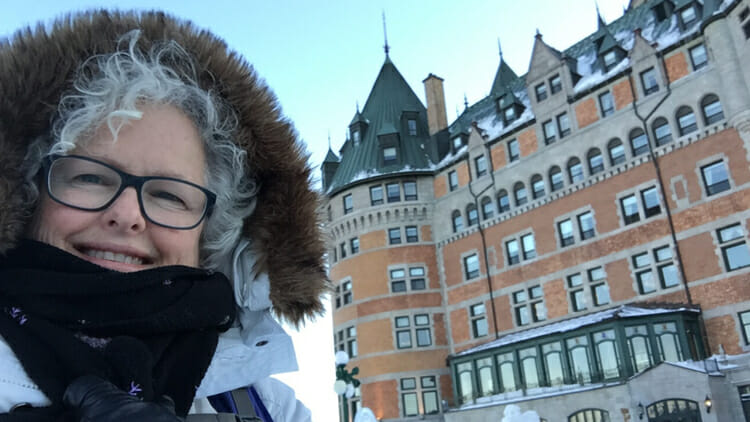
I'm in front of the Chateau Frontenac in Quebec City where I studied French for a week.
Tips to Plan the Right Learning Vacation for You
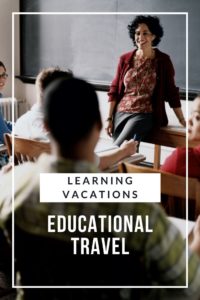
Pin it on Pinterest!
A learning vacation may take a bit more effort to plan but it is so worth it.
- Know what inspires you. What do you want to learn? What skill, art form, or academic study have you always wanted to pursue but have not managed to completely fulfill? What do you want to learn that would be better learned in a specific culture? Knowing your inspiration is step one. It is also likely the easiest step for the person wanting to travel to learn.
- Choose your destination. There are two ways of going about this:
- Choose your destination(s) based on what you want to learn. Perhaps there are a few possible destinations. If you want to learn a language there could be many country destinations. If you want to learn how to cook Indian food, you'll need to decide what kind, as there are regional variations which could dictate your specific destination within the country.
- Choose what you'll learn based on the destination you want to visit. Look at your destination in terms of its specialties. Do your learning goals and your dream destination fit? Research the educational opportunities in your desired destination. For example, perhaps you want to develop your cooking skills and you want to visit the vineyards in Bordeaux. See if you can find a cooking school in the Bordeaux region.
- Find specialty sites for your interest. Looking for an archaeological dig? Here's a list of volunteer opportunities to work beside archaeologists around the world. The same company has many different volunteer opportunities but please be aware, these volunteer trips have a price just like all travel. You could also look into the travel programs from Roadscholar.org (for boomers and retirees). You can go directly to the university of your choice. Here are Oxford University's offerings in the summer of 2020. You can use a site like Academic Courses to find options for hundreds of universities and colleges around the world.
- One-day classes rather than multi-day courses. I have not yet found a good international site for truly educational one-day classes. Most sites like Viator offer tours and activities and are low on the educational options. This is where it's important to choose your destination based on what you want to learn and then dig into the Google results for options based on your interest and destination.
- Use discussion forums for your areas of interest. If you love cooking, go to a site like Chowhound.com which is organized geographically to find the best cooking schools in an area. This is also where TripAdvisor, a site I don't typically recommend, shines.
- If you'll be at your destination for a while, use Meetup.com to find people who share your interests and then ask them for recommendations on classes to take.

I took a short pottery class at La Bisbal d’Empordà, Spain. A great educational travel experience.
Stories about Educational Travel
Here are some of the learning vacations Tracey and I have taken.
- Learnings and Landings in the High Arctic
- Cooking Class and Dinner in Rome
- How to Chautauqua: Your Guide to a Summer of Learning and Fun
- Solo in Prague: Blurred Borders in a Czech Kitchen
“Don't tell me how educated you are. Tell me how much you've traveled.”
It has been attributed to the Prophet Mohammed though that claim has been disputed. Regardless of the source educational travel gets you educated and well traveled.
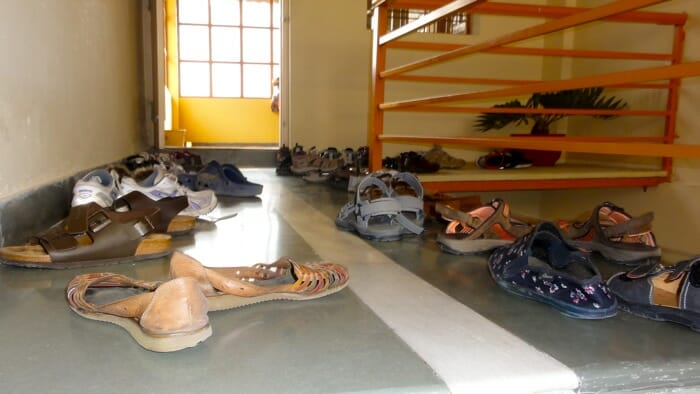
A week at an Ashram in India was a wonderful educational experience. Here are the shoes outside the upstairs yoga room. Of course, I wouldn't take photos of the class in progress.
